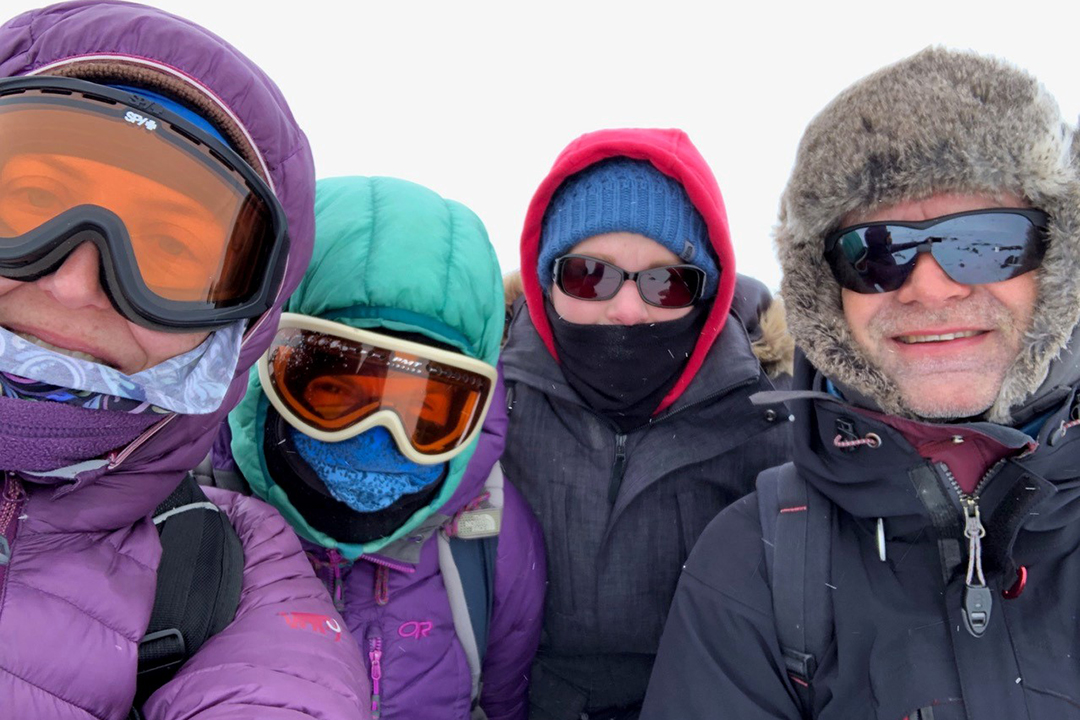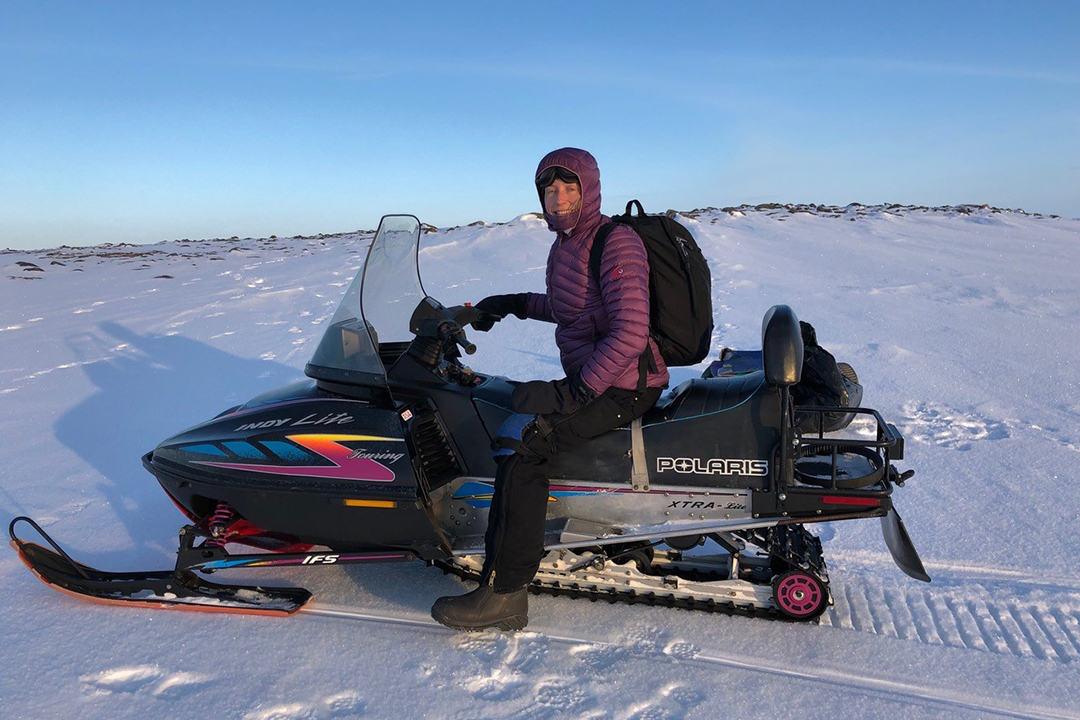
Wildlife health at the top of the world
For two decades, veterinary scientist, Dr. Emily Jenkins has been studying parasites and vector-borne diseases that cause illness in animals and people — and much of that work has been done in Canada’s North.
By Katie Brickman-YoungThe Western College of Veterinary Medicine (WCVM) professor’s passion for the Canadian Arctic was sparked during the final year of her veterinary degree.
“In my undergrad [program], I took a wildlife disease course that had a highly enthusiastic and eccentric professor who made wildlife parasites fascinating to me,” says Jenkins. “In my fourth year [of veterinary school], I saw an advertisement for a graduate project, looking at newly discovered parasites in wild sheep in the Northwest Territories. Something about the North resonates with me.”
Over the past 15 years, Jenkins has worked closely with other researchers and stakeholders in the Canadian North — first as a government research scientist and wildlife disease specialist, and then as a professor. She and her colleagues work to assess current and future risks to wildlife and public health in the North, which in turn can help build strategies to mitigate disease risk for northern wildlife and communities.
Jenkins, along with Patrick Leighton (Université de Montréal), is co-founder of the Canadian Arctic One Health Network (AOHN). The network is funded by ArcticNet, a Network of Centres of Excellence Canada. AOHN focuses on a variety of topics including food-borne parasites, vector-borne diseases, rabies modelling, dog-human interface, wildlife health surveillance, and engaging Indigenous Peoples.
“There is quite a range, and we are a comprehensive group, but given the spirit of One Health, that’s not surprising,” says Jenkins. “The polar north is a small world — in discipline and area.”
The network has research projects taking place in the northern territories, as well as in northern Québec and Labrador. It also has growing international connections through Jenkins’ role as the Canadian representative to the Terrestrial Working Group of the International Arctic Science Committee.
At the Environment and Climate Change Canada field station at Karrak Lake, Queen Maud Gulf (Ahiak) Migratory Bird Sanctuary, Nunavut, Jenkins’ research team has been working for over a decade. The group collects samples from Arctic foxes, which act as sentinels, as well as samples from geese, rodents and mosquitoes.
Elsewhere, she works closely with northern territories on other wildlife species, including fox, wolf, lynx and wolverines. These carnivores are sentinels for Trichinella parasites, tiny roundworms that live in the muscles of animals that eat other animals. There can be outbreaks associated with this particular roundworm from people eating raw or under-cooked meat, usually from bear or walrus in the North.
“A quirk with that parasite is that the northern species are not killed by freezing,” says Jenkins. “It’s a brilliant strategy of the parasite in order to survive in the Arctic, but difficult from a food safety perspective because a lot of people rely on freezing things to kill whatever is in it and then eating it in their preferred way.”
The team is eager to help develop local capacity for testing harvested wildlife (country food). One exciting development is happening at the Nunavik Research Centre (NRC) in northern Québec, which already tests for Trichinella in harvested wildlife. Jointly with USask and Health Canada, the NRC has recently acquired funding for establishing its own PCR lab so it can expand testing to include Toxoplasma, another food-borne parasite.
"One of the clear messages we’ve received from the North is that they need to be able to do the testing themselves. So, we helped them secure the funding and will help them train how to use the equipment,” says Jenkins.
“COVID has really nailed down how important it is that they have their own capacity to do these things.”
Northern scientific sovereignty is a significant component of ArcticNet, and that goal has become even more of a priority because of the COVID-19 pandemic.
“This is a dance that we’ve been doing for a long time, and there is too much of a legacy of science happening in the south on the backs of northern samples and surveys. The more we build in the North, the better. That is one of the outcomes that we are hoping for,” says Jenkins.
“What this pandemic has taught us is that we need to build local capacity to do this research so that it isn’t contingent on a bunch of southern researchers going up each year.”

Another ongoing goal for Jenkins and other AOHN researchers is creating surveillance baselines for parasites and pathogens in the Canadian North, which is warming at three times the global rate. With climate warming, the Canadian Arctic is at risk of seeing a growing number of hosts, vectors and pathogens invade and survive in areas which they have never inhabited before. Creating baselines and connections allows both scientists and northern residents to notice these changes and detect new risks for the North.
That’s one reason students in the One Health Network are launching a new website that will help to better connect northern researchers and communities.
“The western Arctic is undergoing climate change at a rate of at least double the rest of Canada,” states Jenkins. “It is a fragile system and that creates some urgency in getting these baselines.”
It’s not just new pathogens that are a concern: the Arctic may be under siege from very new and very old threats. Jenkins recently participated in an international workshop examining the risk of ancient pathogens that are emerging from thawing permafrost and glaciers.
Despite these concerns, Jenkins points out that many populations of wildlife are doing very well in Canada’s North. Residents are safely harvesting wildlife to provide critical local sources of healthy and traditional foods, especially during a pandemic.
“One Health is fundamentally important in the North. They have very close relationships with the land and the animals that are culturally and historically important, especially from a food security perspective,” says Jenkins. “One Health is an extremely intuitive concept for Indigenous and northern communities because they know that everything is connected.”
As the North continues to warm and the environment changes, Jenkins says it’s essential to address the impacts of climate change as soon as possible.
“We can’t fix climate change, but we can certainly try and get ahead of it. We will need better wastewater management, which is a key public health issue in the North. We can be proactive and look at the systems that will be affected and how we can shore them up now before it becomes an issue.”
Dr. Jenkins will be participating in The Arctic — A Global Health Perspective, a 10-part webinar series that will explore diverse perspectives on Arctic global health. Jenkins will present Country Food Security and Safety in the Canadian Arctic on March 8, 2021. There is limited room in each webinar, so early registration is encouraged.